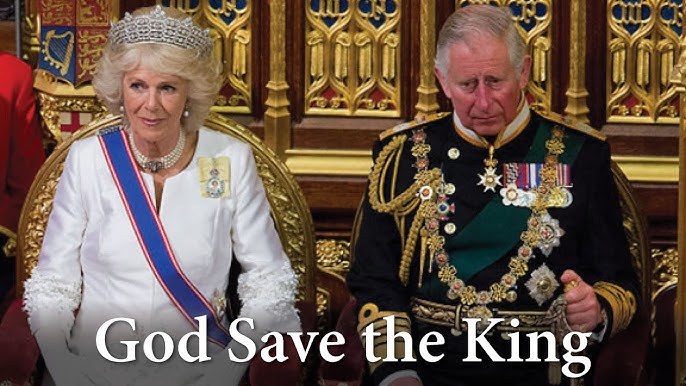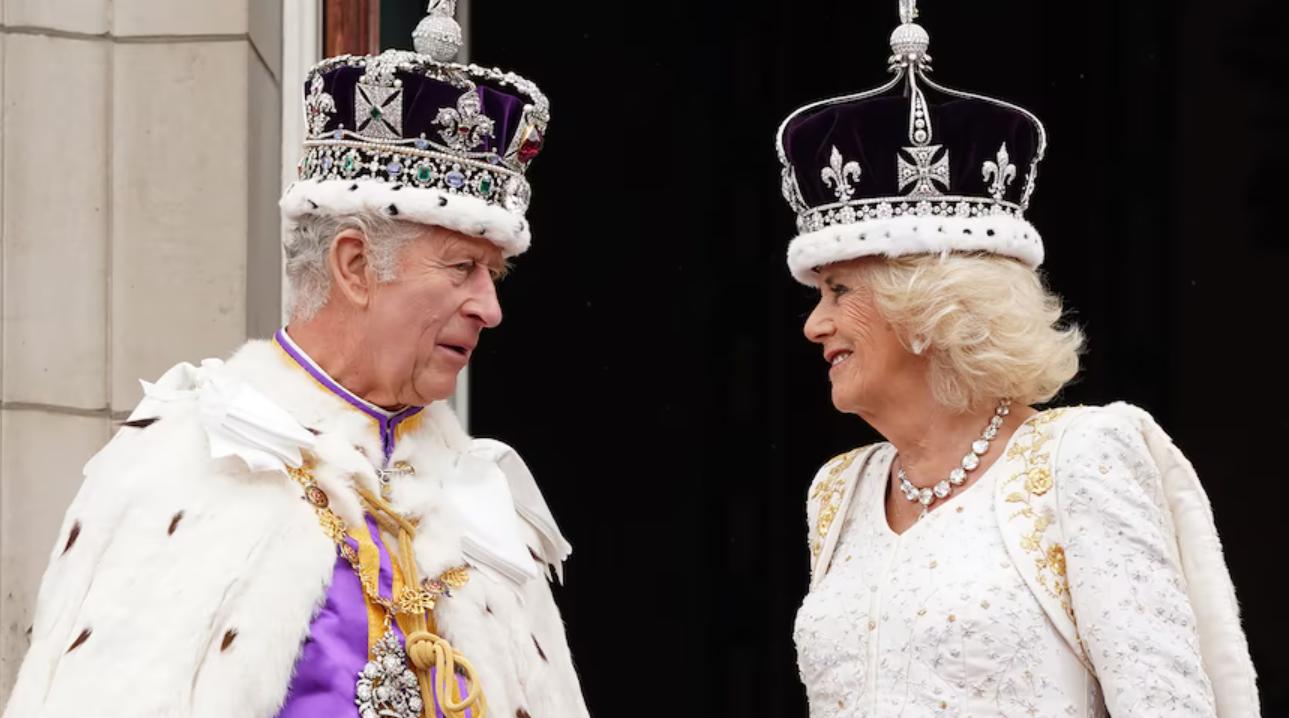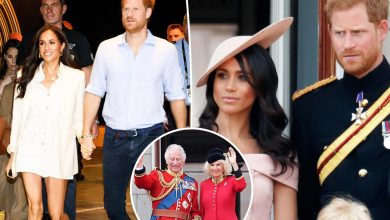Queen Camilla burst in tears as King Charles says final goodbye to royal family amid Cancer health
Imagine the grandeur of Buckingham Palace, the historic walls echoing with whispers of centuries past. Now picture the royal family gathered in the opulent Throne Room, anticipation hanging thick in the air. King Charles, with a regal yet approachable demeanor, steps forward to make an announcement that would send shock waves through the palace and beyond.
“Camila will not just be a queen consort,” he begins, his voice steady but filled with emotion. “She will take on a role that no one expected.”
What could this mean? The room is silent, every eye fixed on the King. This is not just another royal decree; this is a game changer. To understand the gravity of this statement, we need to rewind the clock. King Charles and Camila’s love story is one for the ages, filled with twists, turns, and a fair share of controversy. From their first meeting at a polo match in 1970 to their eventual marriage in 2005, their relationship has been anything but conventional.

Camila, once vilified by the public and media, has slowly but surely won over the hearts of many. Her journey from being “the other woman” to becoming queen consort is a testament to resilience and love. But what exactly is this new role that King Charles has in mind for her?
King Charles’s statement wasn’t just about elevating Camila’s status; it was about redefining what it means to be a queen consort. Traditionally, the role of a queen consort has been largely ceremonial, supporting the king and engaging in charitable work. But Charles envisions something more dynamic for Camila.
“Camila will spearhead our efforts in modernizing the monarchy,” Charles continues. “She will be at the forefront of our initiatives to connect with the younger generation and address contemporary issues.” This is a bold move, one that breaks away from centuries of tradition.
But why now, and why Camila? In an era where the relevance of the monarchy is often questioned, King Charles’s decision to give Camila a more active role is a strategic one. The younger generation, in particular, is looking for a monarchy that is not just a relic of the past but a relevant institution that addresses current issues.
Camila’s new role will involve engaging with youth organizations, championing mental health initiatives, and promoting sustainability efforts. Her down-to-earth personality and genuine concern for these issues make her the perfect candidate for this role.

The palace’s reaction was mixed. As with any major announcement, reactions within the palace were divided. Some members of the royal family were supportive, recognizing the need for change and modernization, while others were more skeptical, concerned about breaking away from tradition. Princess Anne, known for her no-nonsense attitude, was one of the first to voice her opinion:
“Camila has always been a strong support for Charles,” she said in a recent interview. “While this role is not something she’d be a natural for, she does it really well. Well, she provides that change of speed and tone that’s equally important.”
But not everyone was as optimistic. Some courtiers, steeped in tradition, worried about the implications of such a significant shift. Would this move alienate the older generation of royal supporters? Only time will tell.
Outside the palace walls, the public’s reaction was equally divided. Social media was abuzz with opinions ranging from enthusiastic support to outright skepticism. “Finally a step in the right direction,” tweeted one user. “The monarchy needs to evolve, and Camila is the perfect person to lead the change.” Others were less convinced, with one user commenting, “This is just a PR stunt. The monarchy is trying too hard to stay relevant.”
Despite the mixed reactions, one thing is clear: King Charles’s statement has sparked a conversation about the future of the monarchy. In a world where public opinion can make or break an institution, this is a conversation that cannot be ignored.

With this new role comes new challenges. Camila will need to navigate the complexities of modern issues while balancing the expectations of her traditional role. This is no small feat, and the road ahead will be anything but smooth. One of the biggest challenges will be winning over the younger generation. While many are supportive of the monarchy’s efforts to modernize, others remain skeptical. Camila’s ability to connect with this demographic will be crucial in determining the success of her new role.
Another challenge will be managing the internal dynamics of the royal family. Change is never easy, and there will undoubtedly be resistance from those who prefer the status quo. Camila will need to navigate these internal politics with grace and diplomacy.
Despite the challenges, there is a sense of optimism about the future. King Charles’s statement marks a significant shift in the monarchy’s approach, one that embraces change and seeks to remain relevant in a rapidly evolving world. Camila’s new role is a testament to the monarchy’s willingness to adapt and evolve. It is a recognition that tradition and modernity can coexist, and that the monarchy can play a meaningful role in addressing contemporary issues.
As we look to the future, one thing is certain: the monarchy is entering a new era, one that promises to be both challenging and exciting. At the heart of this transformation is Camila, a queen consort who is ready to redefine her role and make a lasting impact.
To fully appreciate the significance of this announcement, it’s important to understand the historical context. The British monarchy has undergone numerous transformations over the centuries, adapting to changing political, social, and cultural landscapes. From the days of absolute monarchy to the constitutional framework we see today, the institution has shown remarkable resilience and adaptability.
King Charles’s decision to redefine Camila’s role is a continuation of this tradition of evolution. It reflects a recognition that the monarchy must remain relevant and responsive to the needs and expectations of the people it serves. This is not just about preserving an institution; it’s about ensuring that it continues to play a meaningful role in the modern world.
The role of the queen consort has traditionally been one of support and service. Queens consort have often been seen as the king’s partner, providing emotional and moral support while engaging in charitable and ceremonial duties. However, there have been notable exceptions where queens consort have played more active and influential roles. Queen Victoria’s consort, Prince Albert, is a prime example. Albert was deeply involved in the administration of the monarchy and played a significant role in shaping its policies and public image. Similarly, Queen Elizabeth II’s consort, Prince Philip, was known for his active involvement in various charitable organizations and his efforts to modernize the monarchy.

King Charles’s vision for Camila’s role builds on this legacy of active and engaged consorts by giving her a more prominent and dynamic role. He is acknowledging the importance of having a partner who can contribute meaningfully to the monarchy’s mission and goals.
Camila’s journey to becoming queen consort has been anything but straightforward. Her relationship with King Charles was initially met with widespread disapproval, and she faced intense scrutiny and criticism from the media and the public. However, over the years, she has worked tirelessly to win over the hearts and minds of the people through her dedication to charitable work and her genuine concern for various social issues. Camila has gradually earned the respect and admiration of many. Her involvement in causes such as literacy, domestic violence prevention, and animal welfare has demonstrated her commitment to making a positive impact.
King Charles’s decision to elevate her role is a recognition of her contributions and a testament to her resilience. It is also a signal to the public that the monarchy values and appreciates the efforts of those who serve it with dedication and integrity.
Change is never easy, especially within an institution as steeped in tradition as the British monarchy. King Charles’s announcement has undoubtedly caused ripples within the royal family, and it will take time for everyone to adjust to the new dynamics. For some members of the royal family, this change represents an opportunity to modernize and stay relevant. For others, it may be seen as a departure from tradition.





